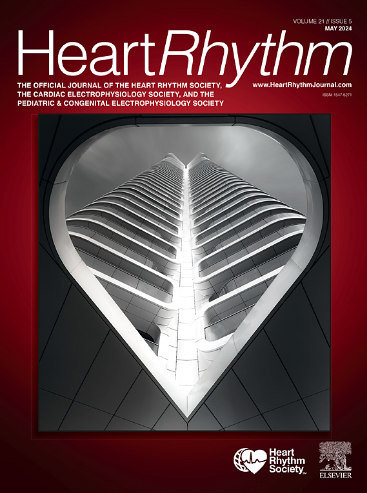Autoimmune cardiac channelopathies and heart rhythm disorders: A contemporary review
IF 5.6
2区 医学
Q1 CARDIAC & CARDIOVASCULAR SYSTEMS
引用次数: 0
Abstract
Cardiac arrhythmias still represent a major health problem worldwide, at least in part because the fundamental pathogenic mechanisms are not fully understood, thus affecting the efficacy of therapeutic measures. In fact, whereas cardiac arrhythmias are in most cases due to structural heart diseases, the underlying cause remains elusive in a significant number of patients despite intensive investigations even including postmortem examination and molecular autopsy. A large body of data progressively accumulated during the last decade provides strong evidence that autoimmune mechanisms may be involved in a significant number of such unexplained or poorly explained cardiac arrhythmias. Several proarrhythmic anti–cardiac ion channel autoantibodies have been discovered, in all cases able to directly interfere with the electrophysiologic properties of the heart but leading to different arrhythmic phenotypes, including long QT syndrome, short QT syndrome, and atrioventricular block. These autoantibodies, which may develop independent of a history of autoimmune diseases, could help explain a percentage of arrhythmic events of unknown origin, thereby opening new frontiers for diagnosis and treatment of heart rhythm disorders. Based on this evidence, the novel term autoimmune cardiac channelopathies was coined in 2017. Since then, the interest in the field of cardioimmunology has shown a tumultuous growth, so much so that the number of arrhythmogenic anti–ion channel autoantibodies reported has significantly increased, also in association with not previously described arrhythmic phenotypes, such as atrial fibrillation, Brugada syndrome, and ventricular fibrillation/cardiac arrest. Thus, an updated reassessment of this topic, also highlighting perspectives and unmet needs, has become necessary and represents the main objective of this review.
自身免疫心脏通道病和心律失常:当代综述
心律失常仍然是世界范围内的一个主要健康问题,至少部分原因是其基本致病机制尚未完全了解,从而影响了治疗措施的疗效。事实上,虽然心律失常在大多数情况下是由于结构性心脏疾病,但在大量患者中,尽管进行了深入的调查,甚至包括尸检和分子尸检,其根本原因仍然难以捉摸。在过去十年中逐渐积累的大量数据提供了强有力的证据,表明自身免疫机制可能参与了大量此类无法解释或解释不清的心律失常。已经发现了几种促心律失常的抗心脏离子通道自身抗体,在所有情况下都能够直接干扰心脏的电生理特性,但导致不同的心律失常表型,包括长qt综合征、短qt综合征和房室传导阻滞。这些自身抗体可能独立于自身免疫性疾病的历史,可以帮助解释一部分原因不明的心律失常事件,从而为心律紊乱的诊断和治疗开辟了新的领域。基于这一证据,2017年创造了新的术语“自身免疫性心脏通道病变”。从那时起,对心脏免疫学领域的兴趣急剧增长,以至于报道的致心律失常抗离子通道自身抗体的数量显著增加,也与以前未描述的心律失常表型有关,如心房颤动、Brugada综合征和心室颤动/心脏骤停。因此,有必要对这一专题进行最新的重新评价,同时突出观点和未满足的需要,这是本审查的主要目标。
本文章由计算机程序翻译,如有差异,请以英文原文为准。
求助全文
约1分钟内获得全文
求助全文
来源期刊

Heart rhythm
医学-心血管系统
CiteScore
10.50
自引率
5.50%
发文量
1465
审稿时长
24 days
期刊介绍:
HeartRhythm, the official Journal of the Heart Rhythm Society and the Cardiac Electrophysiology Society, is a unique journal for fundamental discovery and clinical applicability.
HeartRhythm integrates the entire cardiac electrophysiology (EP) community from basic and clinical academic researchers, private practitioners, engineers, allied professionals, industry, and trainees, all of whom are vital and interdependent members of our EP community.
The Heart Rhythm Society is the international leader in science, education, and advocacy for cardiac arrhythmia professionals and patients, and the primary information resource on heart rhythm disorders. Its mission is to improve the care of patients by promoting research, education, and optimal health care policies and standards.
 求助内容:
求助内容: 应助结果提醒方式:
应助结果提醒方式:


